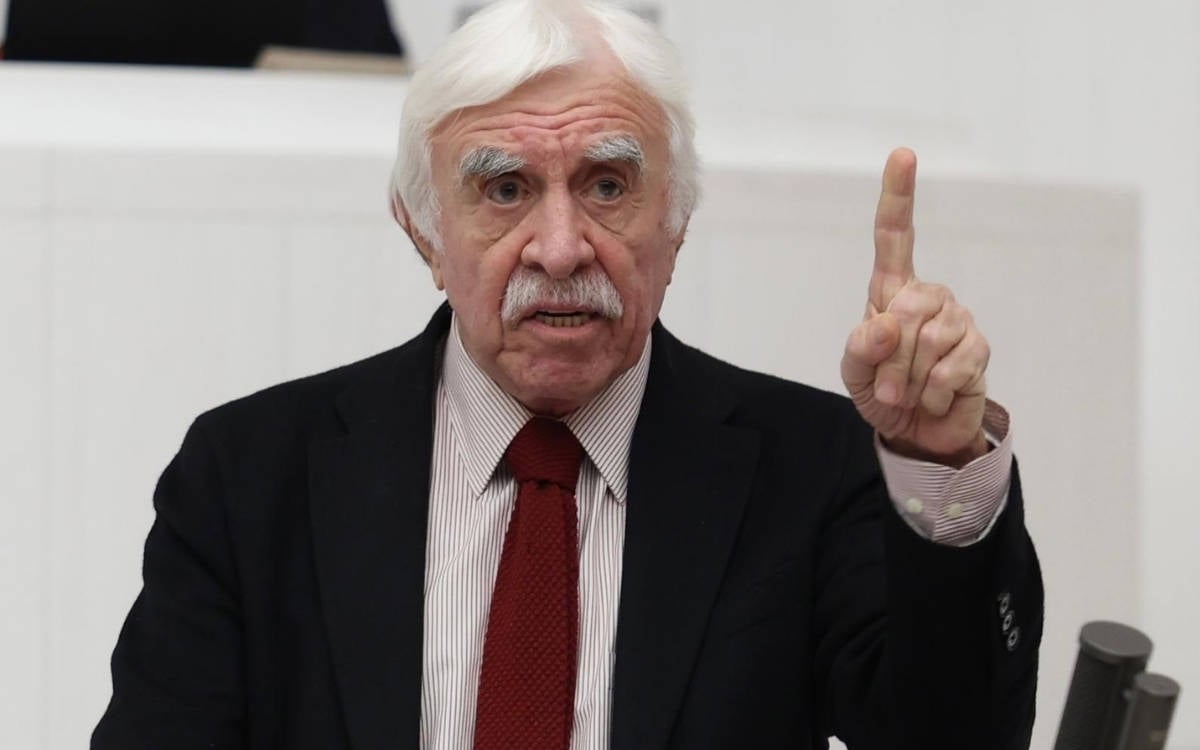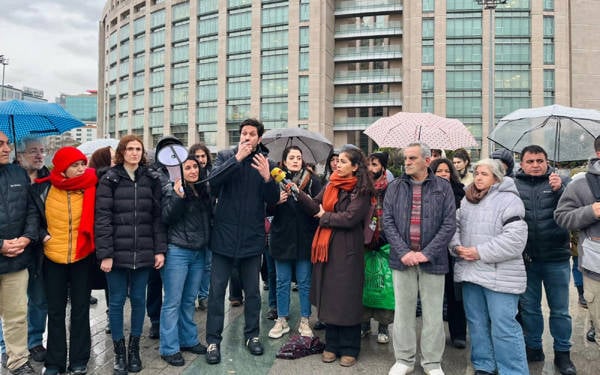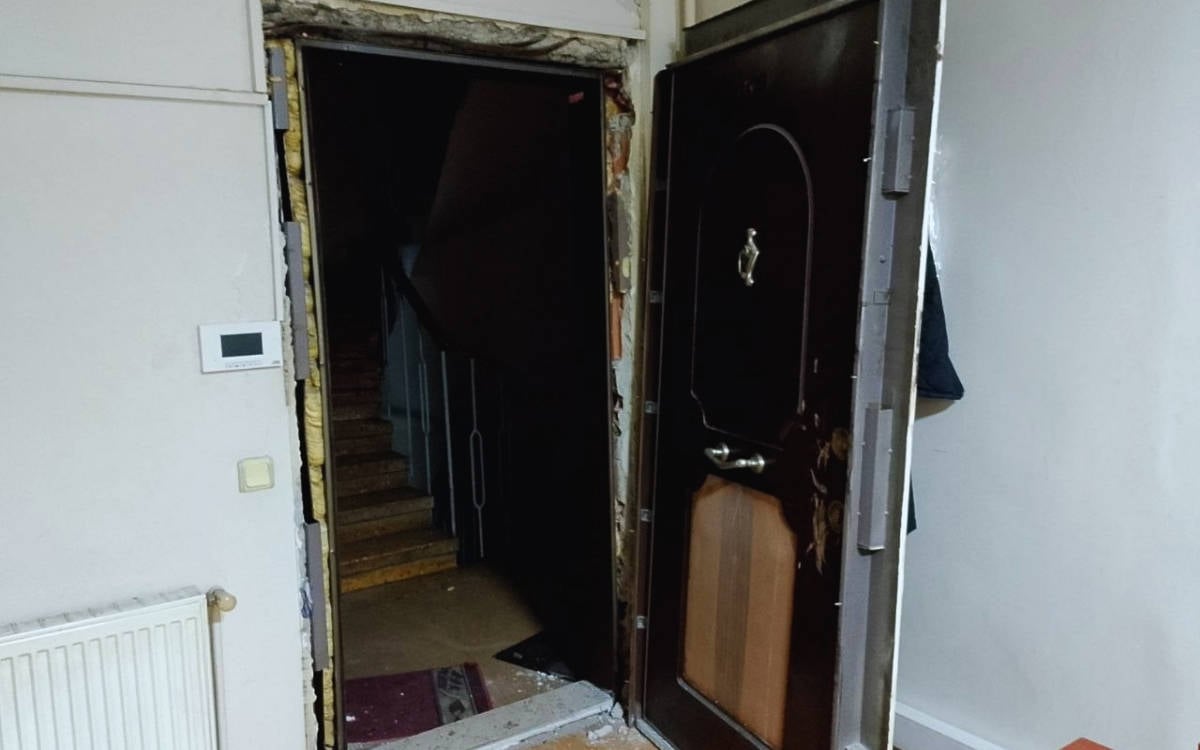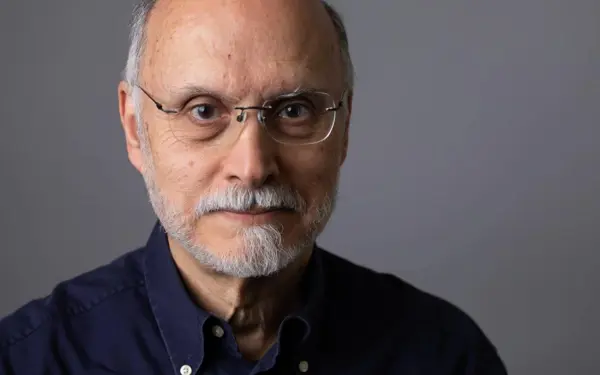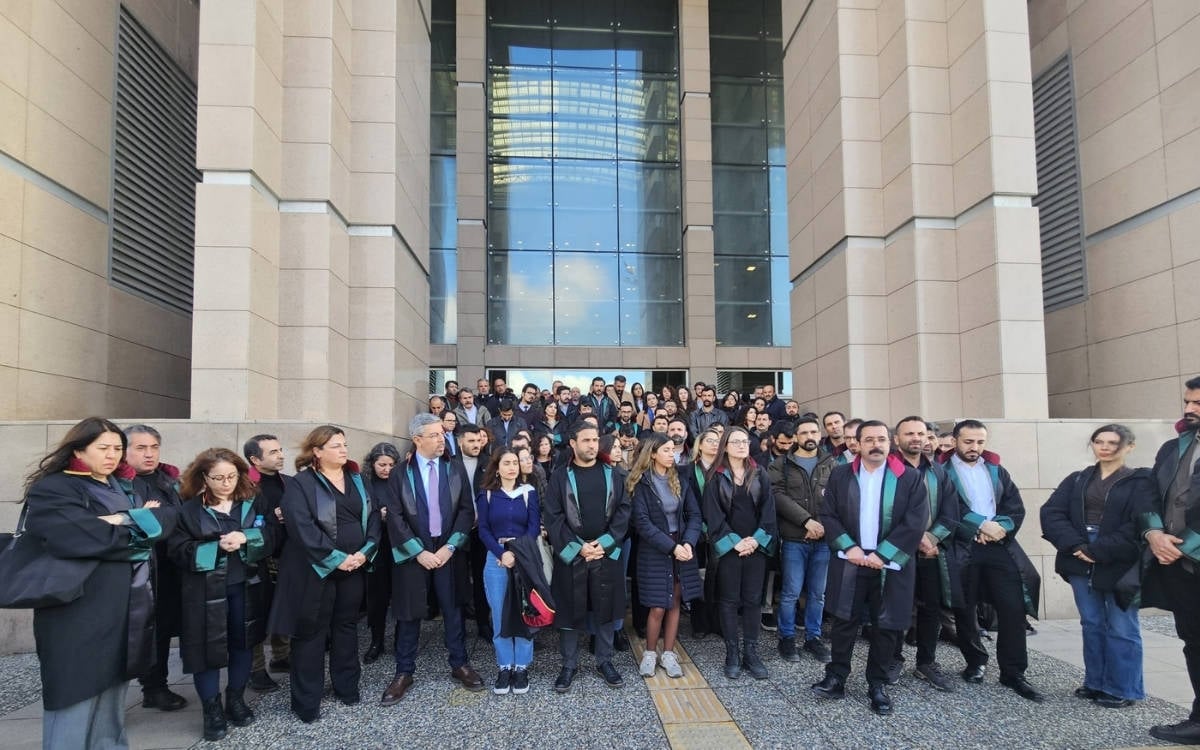Photo editor: Gizem Bayıksel
Click to read the article in Turkish
Kahraman Alsancak was born in 1948. He was from the village of Cumhuriyet in Manyas, Balıkesir.
A worker at the Uzel factory, Alsancak was only 29 years old when he lost his life in Taksim on 1 May 1977. He was married and the father of two.
Autopsy report
According to the autopsy report, the cause of Kahraman Alsancak's death was cerebral oedema due to blunt trauma to the head along with mechanical asphyxia due to compression of the abdomen and chest.
The village house where he grew up still stands, although it is now on the verge of collapse. Kahraman Alsancak is commemorated every year on the village's social media accounts.
Legacy
Unfortunately, I was unable to reach Kahraman Alsancak's children, but I was able to contact their niece, Berna Gülümser, and her husband, Mahir Babur. I learned that Kahraman Alsancak was the maternal uncle of Berna's father. Berna recalled from her childhood that his photo hung on the wall of her grandmother's house, as a "Martyr of the First of May". Although Berna's husband, Mahir Babur is a quite distant relative of Kahraman Alsancak, he was also interviewed by the Confederation of Progressive Trade Unions of Turkey (DİSK) in 2010-2011 during their efforts to reach the families of those who lost their lives on 1 May 1977.
Mahir Babur went down on record as saying: "Because we are now the third generation, there is no information about him that I can give you. At one point everyone was calling us, but after a while, the phone calls stopped. We take to the squares on the First of May holding Kahraman's photo because it is our historical responsibility. We are proud of his legacy."
After speaking with Berna Gülümser and Mahir Babur, I was also able to talk, thanks to Nadir Yıldız and Tanzer Gülümser, with retired teacher Mehmet Nuri Tozak, who was a friend of Kahraman Alsancak from his village and who was with him on Taksim Square on 1 May 1977.
Nuri Tozak told me about his "brother" Kahraman, or "Kahraman Abi", about how they recovered his body, and what he experienced at the time.
Mehmet Nuri Tozak, friend:
He was an "abi", or "big brother", of our village. He was four or five years older than me. Because I was studying in Istanbul, Kahraman Abi and I would get together in Istanbul too.
I was at the rally on 1 May 1977, to celebrate Labour Day. I was part of the Man Factory workers group. The workers were slowly entering the square, and that's when I saw Kahraman Abi.
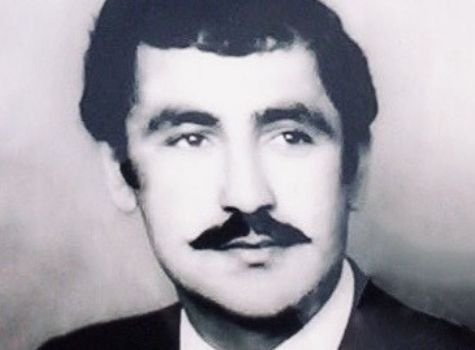
He was steward
He was a steward at the demonstration, and had a red band on his arm that said "steward". We kissed and hugged each other and talked for a bit. He told us about issues they were having at his workplace. He was unhappy about what was happening at the factory. We parted ways after that brief chat, and he went to join his own contingent.
Then we reached Serencebey Slope. They kept us, the Man Factory workers' group, waiting there for a while, before we were finally allowed to march up the slope. When we got to the top, we saw the Beyoğlu District Branch of the Justice Party to our right. There was a group of people on the balcony. The stewards guided us to our place in line. Kemal Türkler hadn't yet taken the stage.
We were from the same village
I looked around. There were people at the Water Administration building too. Kahraman Abi came over to us again, this time with two other men from our village. We were hungry after waiting for so long, so we decided to go get something to eat. But it was impossible to leave the square because of security. We were able to get permission and leave, thanks to another friend who was also a steward. We got ourselves some meatball sandwiches. It was then that all hell broke loose. Everything was covered in a cloud of dust. We lost one another. We ran all the way to Unkapanı. My older brother was a riot policeman, and he was on duty. He'd already told me not to go that day. He said it could get ugly, that something might happen to me if I went. I didn't listen to him of course and went anyway. After it all happened, I finally reached home and got some rest. I'd run all the way to Güngören.
Taksim Emergency Hospital
My older brother and I were living together at the time. We got up the next morning and went straight to the coffeehouse. I looked at the newspaper and saw that Kahraman Abi was listed among the dead. There was someone else from our village just behind us, and he joined us and the three of us set out to find his body. Like I said, my brother was a policeman, so we thought they'd listen to him.
We went to the Taksim Emergency Hospital. We asked around, trying to find out where Kahraman Abi's body was, someone on duty there told us that they'd taken him to Sultanahmet. So we went straight to Sultanahmet. My brother, me, and our cousin. In fact, a photo of the three of us from that day, of us waiting for his body, was printed in the newspaper Günaydın.
Number 1, number 2, number 3...
After a long wait, we went to the morgue. They'd taken photos of all the bodies and numbered them. Number 1, number 2, number 3... We couldn't identify him of course, all the bodies were so bloated. Then our cousin told us he'd found Kahraman Abi. He identified him from a photograph. Kahraman Abi's wife was waiting at the door, holding their son, Ümit. He must have been four or five months old. Three or four more people from the village had come for the body too.
My brother went first, because he was a policeman. He told them, "This is the body of our relative, we want to claim it." They asked us where we were going to take it, and when we told them to Manyas, to his village, they wouldn't let us. "We're under martial law, you have to pick somewhere around here, soldiers will escort you and you'll bury it there," they said. They assigned a squad of soldiers to accompany us.
Eight bullet wounds
They opened the morgue. The bodies had been placed in a series of drawers one above the other. They were completely naked. An attendant went and pulled out the body from the locker where Kahraman Abi was. "Is this him?" he asked. That's how we recovered his body.
We rented a pickup truck and put him in the back.
We washed Kahraman Abi's body. I went in while he was being washed. We counted eight bullet wounds, and there were marks on his body from having been beaten with a club too.
We took his body to Esenler, accompanied by soldiers. There was a cemetery on the hill back then, nowadays it's a bus terminal, as far as I know. We buried him there. Then we said our goodbyes and went our separate ways.
His body
Some time later, his son came to the village. He was grown up by then. We talked about his father. And he was just like him, just like his father.
We wanted to bury him in the village, but they wouldn't let us. Later we even spoke with Doğan Subaşı, who's also from our village, and told him we should bring the body to the village and have a nice mausoleum built for him. Doğan said we needed the family's permission. But his family didn't want to go through all that, which is understandable.
A worker at Uzel
Kahraman Abi was a worker at the Uzel Factory. He told us about problems at his workplace, he wasn't happy. He told us they weren't being treated fairly at all.
He had two children; a son and a daughter.
He was a kind, generous person.
In the village, we didn't enter a place if our elders were there, out of respect for them. That's how it was back then. We only entered the coffeehouse once our elders had left, for example. It was similar at weddings and the like. But Kahraman Abi always made sure we got in, regardless. He didn't dwell on things like that.
A downright good person
The girls from the village would go somewhere, for example, to shuck corn, say. And Kahraman Abi would help them out too. The village of Cumhuriyet was one of solidarity. And Kahraman Abi never hesitated to take on any sort of task, he helped take the load off of others.
Kahraman Abi was our brother, tall and handsome.
He was a downright good person.
May he rest in peace.
(TY/NÖ/VK)
About Tuğçe YılmazJournalist, editor, researcher. "1 May 1977 The Voices of Those Who Lost Their Loved Ones / 1 May 1977 and Impunity" she was engaged in this dossier as a researcher, reporter, editor and writer. Her articles, interviews and reports are published in outlets such as bianet, BirGün Book, K24, 5Harfliler, Gazete Karınca and 1+1 Forum. She graduated from Ege University, Faculty of Literature Department of Philosophy. She was born in Ankara in 1991. |
 |
| This text was created and maintained with the financial support of the European Union provided under Etkiniz EU Programme. Its contents are the sole responsibility of "IPS Communication Foundation" and do not necessarily reflect the views of the European Union. |
CLICK - 1 May 1977 e-book is online
The ones who lost their lives on 1 May '77The ones whose loved ones we could talk to: Ahmet Gözükara (34, teacher), Ali Sidal (18, worker), Bayram Çıtak (37, teacher), Bayram Eyi (50, construction worker), Diran Nigiz (34, worker), Ercüment Gürkut (27, university student), Hacer İpek Saman (24, university student), Hamdi Toka (35, Seyyar Satıcı), Hasan Yıldırım (31, Uzel worker), Hikmet Özkürkçü (39, teacher), Hüseyin Kırkın (26, worker), Jale Yeşilnil (17, high school student), Kadir Balcı (35, salesperson), Kıymet Kocamış (Kadriye Duman, 25, hemşire), Kahraman Alsancak (29, Uzel worker), Kenan Çatak (30, teacher), Mahmut Atilla Özbelen (26, worker-university student), Mustafa Elmas (33, teacher), Mehmet Ali Genç (60, guard), Mürtezim Oltulu (42, worker), Nazan Ünaldı (19, university student), Nazmi Arı (26, police officer), Niyazi Darı (24, worker-university student), Ömer Narman (31, teacher), Rasim Elmas (41, cinema laborer), Sibel Açıkalın (18, university student), Ziya Baki (29, Uzel worker), The ones whose loved ones we did/could not talk to: Aleksandros Konteas (57, worker), Bayram Sürücü (worker), Garabet Akyan (54, worker), Hatice Altun (21), Leyla Altıparmak (19, hemşire), Meral Cebren Özkol (43, nurse), Mustafa Ertan (student), Ramazan Sarı (11, primary school student) The ones only the names of whom are known: Ali Yeşilgül, Mehmet Ali Kol, Özcan Gürkan, Tevfik Beysoy, Yücel Elbistanlı The one whose name is unknown: A 35-year-old man |
The voices of those who lost their loved ones: 1 May '77 and impunity
Political panorama of Turkey-1977
Film industry worker Rasim Elmas, 41, died in Taksim
Construction Worker Bayram Eyi, 50, died in Taksim
Teacher Bayram Çıtak, 37, died in Taksim
High School Student Jale Yeşilnil, 17, died in Taksim
Teacher Kenan Çatak, 31, died in Taksim
Teacher Ahmet Gözükara, 33, died in Taksim
Teacher Hikmet Özkürkçü, 39, died in Taksim
Student-laborer Niyazi Darı, 24, died in Taksim
University student Nazan Ünaldı, 19, died in Taksim
Teacher Ömer Narman, 31, died in Taksim
Laborer Ali Sidal, 18, died in Taksim
Counterperson Kadir Balcı, 35, died in Taksim
Student Hacer İpek Saman, 24, died in Taksim
Factory Worker Kahraman Alsancak, 29, died in Taksim
Laborer Hüseyin Kırkın, 23, died in Taksim
Student Ercüment Gürkut, 26, died in Taksim
Public order police officer Nazmi Arı, 26, died in Taksim
Laborer Mahmut Atilla Özbelen, 26, died in Taksim
Factory worker Hasan Yıldırım, 31, died in Taksim
Itinerant salesperson Hamdi Toka, 35, died in Taksim
Security Guard Mehmet Ali Genç, 60, died in Taksim
Factory Worker Ziya Baki, 30, Died in Taksim
Laborer Mürtezim Oltulu, 42, Died in Taksim
Teacher Mustafa Elmas, 33, Died in Taksim
Student Sibel Açıkalın, 18, died in Taksim
Laborer Diran Nigiz, 34, died in Taksim
1 May 1977 & Impunity
'The state is implicated in this crime, perpetrators must be put on trial'
'If you can't find the killers, you can't remove the stain'
'The perpetrators of the 1 May 1977 massacre got away with it'
Remembrance as a matter of dignity and the fight against impunity
Who is hiding the truth and why?





.jpg)
